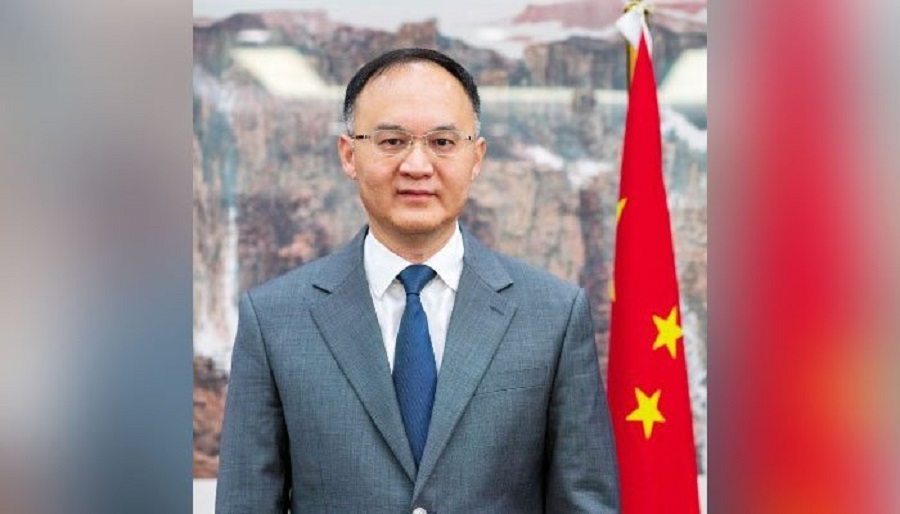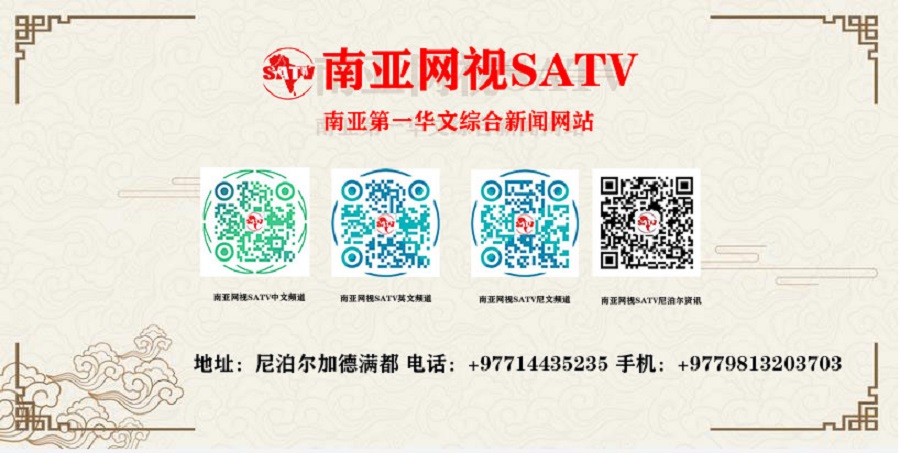
Chinese Ambassador to Pakistan Nong Rong has said China stands by Pakistan in these difficult times as the two countries are strategic allies which stood by each other in the face of all challenges.
“China is eager to support Pakistan in pursuing its development model appropriate for the circumstances on the ground because the two countries are all-weather friends,” he stated in his opening remarks at a dialogue titled Global Development & Governance, held at the Pakistan-China Institute and Academy of Contemporary China & World Studies.
The dialogue was also addressed by Senator Mushahid Hussain Syed, chairman of the Defence Committee and the Pakistan-China Institute, and Gao Anming, vice president and editor-in-chief of China International Communications Group (CICG). The dialogue was moderated by Mustafa Hyder Syed, executive director of Pakistan-China Institute, and Lin Kun, vice president of Academy of Contemporary China and World Studies.
Nong Rong said through CPEC, China was eager to expand its exchanges in the area of governance such as lowering poverty levels and raising people’s standards of living. He praised the Communist Party of China (CPC) whose initiatives profoundly changed China. He said the upcoming 20th Congress of CPC would make plans for the future and set new objectives that would be accomplished by working together to benefit all people.
Mushahid Hussain Syed, while referring to US House of Representatives Speaker Nancy Pelosi’s visit to Asia, especially Taiwan, said this would be an unwarranted provocation, adding that such a high-level visit by an American official violated the One-China Policy agreed to by the United States and the People’s Republic of China in the Shanghai Communique. He said such provocations had the potential to destabilize Asia and generate a new type of confrontation, something Asia could not afford in these challenging times. Pakistan, he said, was committed to the One-China Policy and preserving, promoting and protecting the strategic partnership with China.
He discussed President Xi Jinping’s Belt and Road Initiative and termed it the 21st century’s most important development and diplomatic initiative. He said the CPEC, the BRI’s flagship undertaking, was progressing admirably since it had modernized the nation’s infrastructure and raised the socioeconomic standing of its citizens. In this context, he quoted two studies by the Harvard University.
The first study, titled Understanding CCP Resilience: Surveying Chinese Public Opinion Through Time, was published by the Ash Center for Democratic Governance and Innovation of Harvard University in July 2020. The study found that there was very high satisfaction with the central government in China. The second study by Graham Allison of the Harvard University was titled The Great Tech Rivalry: China vs the US. This study shows that China has displaced the US as the world’s top high-tech manufacturer, producing 250 million computers, 25 million automobiles and 1.5 billion smartphones in 2020. Moreover, it says that beyond becoming a manufacturing powerhouse, China has become a serious competitor in the foundational technologies of the 21st century: artificial intelligence (AI), 5G, quantum information science (QIS), semiconductors, biotechnology, robotics and green energy.
At the outset, Mushahid congratulated China on the 95th anniversary of founding of the People’s Liberation Army (PLA), which was specially celebrated at the GHQ as a gesture of goodwill. He lauded the cooperation between the Pakistan Army and the PLA, including the comments by COAS General Bajwa that the both armies were ‘brothers in arms”.
Gao Anming stressed deepening high-quality cooperation under the Belt and Road Initiative and actively promoting the construction of the China-Pakistan Economic Corridor. “Global development is inseparable from connectivity and open cooperation,” he said, adding that the joint construction of the Belt and Road initiative pursued development, advocated win-win results and conveyed hope. He said as a landmark project, the CPEC construction was a practical example of win-win cooperation between the two countries. Since the start of the construction in 2015, the CPEC brought a total of $25.4 billion in direct investment to Pakistan with 22 priority projects completed, which resulted in the creation of more than 70,000 jobs, effectively improving people’s well-being.
After the opening remarks, a joint research publication titled Pakistan’s View on Governance of China in The New Era (2012-2022): Perception & Inspiration was released by Ambassador (retd) Aizaz Ahmed Chaudhry, former foreign secretary and currently DG, Institute of Strategic Studies. Presenting the paper, Chaudhry said China had climbed the ladder of development much faster than other countries. Under Mao Zedong, China focussed on three key areas: universal education, mobilization of women in the workforce and mobilization of people in the workforce.
Moreover, he said he observed two significant features of Chinese governance: first, China adheres to governance with a clear vision and purpose. China, through this, wants to achieve the goal of making China a moderately prosperous society by 2049. Second, it seems that the Chinese governance system is centralized at the outset. In reality, it is highly decentralized as local congresses across the counties and townships are elected democratically with guidance from the top. Lastly, countries like Pakistan need to learn from China’s peaceful rise.
Yu Yunquan, president of Academy of Contemporary China and World Studies, said that in the report, many Pakistani experts believed that there were two reasons why China could achieve “good governance” in the new era: one was the wise leadership of President Xi Jinping whose thoughts on governing the country had been highly recognized by the international community including Prime Minister Shehbaz Sharif and the second was that the democratic consultative governance brought together a wide range of representation of people’s power. For instance, more than 1 billion voters in China directly elected more than 2 million deputies to People’s Congresses across the county and township levels, probably the world’s largest grassroots election.
Mustafa Hyder Syed, executive director of Pakistan-China Institute, said the era of reform and opening-up was the inflection point that transformed China into the second biggest world economy. He attributed China’s peaceful rise to the policy consistency the successive leaders had adopted. He said China’s vision of building a community of shared future was being achieved as a result of President Xi Jinping’s people-centric policies. The necessity for consistency and continuity was always there. Because of these two features of China’s governance, it would handle all the pressing issues it faced domestically and internationally. He said the CPC was the driving force behind China’s prosperity. That was why, he said, it was being targeted intentionally through disinformation campaigns. He also cited Kishore Mehboobani’s book titled “Has China won?” which states that more than 130 million Chinese tourists go to other countries freely and all willingly return to their homes in China every year, which shows they are content with the state of affairs in China.
Wang Xiaohui, editor-in-chief of China Internet Information Center, quoted President Xi Jinping as saying that “only the man who wears the shoes can tell whether it fits or not”. China’s development model, he said, was people-centered and had achieved significant dividends over the period. Commenting on the CPEC, he said both countries had deepened cooperation during its first phase, which resulted in alleviating the energy crisis and infrastructure modernization.
Dr Ye Hailin, deputy director general of Bureau of International Cooperation, Chinese Academy of Social Sciences, said that in the coming days, the world would witness increasing uncertainty due to the global supply chain disruption triggered by the Ukraine crisis. Moreover, Nancy Pelosi’s tentative visit to Taiwan would escalate the situation in the region. The international community needed to pay attention to these issues since such escalations won’t benefit any party. He also called for a third-party participation in the CPEC.
Sultan M Hali quoted Napoleon Bonaparte who said, “Let China sleep. For when she wakes, she will shake the world.” He commended President Xi Jinping for maintaining the momentum of prosperity pursued by his predecessors. He said China’s governance in the new era (2012-2022) was a prime example of policy consistency and commitment to people’s prosperity. He lauded China’s handling of the coronavirus pandemic at home and the assistance it provided to developing and developed countries in the form of medical aid.
Dr Zhang Jidong, research fellow and division director for International Cooperation, National Development and Reform Commission, quoted President Xi Jinping who said China and Pakistan were all-weather strategic cooperative partners and firmly supported each other on issues concerning each other’s core interests and major concerns. He said the mutual trust and friendship between the two countries stood the test of 70 years of international vicissitudes and had always been rock solid.
Dr Safdar Sohail, dean of National Institute of Public Policy, Lahore, said that CPEC would be the roadmap for deeper bilateral trade and investment cooperation between Pakistan and China. Both countries, he said, wanted to cement this relationship further, and it would only be possible through collective efforts of both parties.
Dr Vaqar Ahmed, joint executive director of Sustainable Development Policy Institute, said: “We learned from China the importance of community-level governance, which has lifted millions of people out of poverty.” He said the economic growth alone could not alleviate poverty unless the economic activity generated employment. Moreover, he suggested including the services sector in the Free Trade Agreement between Pakistan and China.



